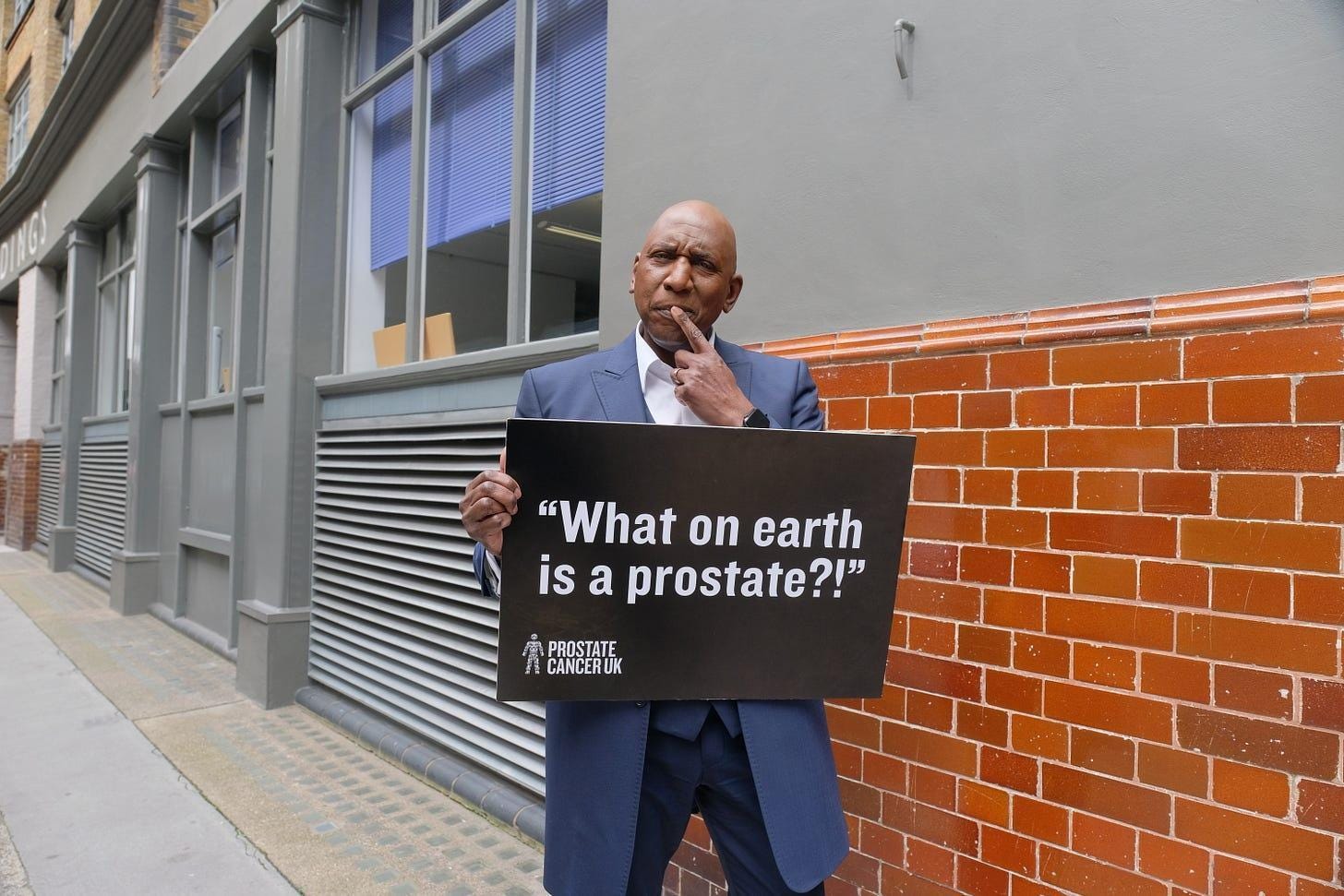By Howard Wolinsky
This is a tale of two famous men who went on Active Surveillance for low-risk prostate cancer.
There are lessons for other high-profile men diagnosed with low-risk prostate cancer to not hide in the AS closet, but to tell their stories and reduce the stigma and shame with cancer,
One man, a renowned scientist, who led the effort to decode the human genome, left Active Surveillance a few months ago with great fanfare, including telling his story in an op-ed in the Washington Post. He dropped surveillance for radical prostatectomy after having kept his cancer and his AS largely a secret for five years.
The other patient, is a widely acclaimed TV sports reporter, who announced he went on AS with a flourish in an exclusive interview in Sports Illustrated.
Both are public figures who showed different styles to managing news about their cancers. The way A-listers handle news about any disease they have impacts public perceptions about them and the disease.
Take actor Michael J. Fox, who at age 29 was diagnosed with Parkinson’s disease and became a true advocate for research on this deadly and disabling condition.
In the low-risk prostate cancer world, we get even less respect, than comedian Rodney Dangerfield as reflected in funding for research. We need a Michael J. Fox.
Many A-listers with high-risk prostate cancer or who have been treated have been open. These patients are in the public eye and can’t hide their diagnosis.
Take singer/actor Harry Belafonte, the late U.S. Sen. and GOP presidential hopeful Sen. Bob Dole, golfer Arnold Palmer, Generals Colin Powell and Stormin’ Norman Schwartzkopf (more on the generals in the next issue) and loads of rock stars, including rocket man Sir Elton John and Sir Rod “Forever Young” Stewart.
Sir Elton even has confessed to having a Depends moment while on stage in Vegas. Such openness helps reduce the fear and stigma of cancer.
I think it’s fair to assume at least a few actors, politicians, musicians, athletes, business leaders, go on AS, just like the rest of us. But to protect their images they don’t go public.
It’s easy for those of us with low-grade prostate cancer to keep to our own counsel. We can hide our diagnosis because we don’t experience physical changes from treatment, and we don’t miss a lot of time for treatment, hospitalizations and recoveries.
***
Francis Collins, MD, PhD, one of the world’s top scientists, has described himself as a poster child. I’m not sure for what. For having a prostatectomy? Or for having left AS?
Collins is big-time. He lead the effort to decode the human genome. He is former director of the National Institutes of Health, which made him boss of the National Cancer Institute. For better or worse, he led the U.S. effort to fight COVID; Dr. Anthony Fauci, the government’s face on COVID, reported to Collins.
When Collins speaks, people listen. We sure could have used his help on promoting AS as a temporary (as in his case) or permanent approach to managing low-risk PCa.
Collins wrote an op-ed in the Washington Post last April about his plans to undergo a radical prostatectomy after five years on AS. I hope his piece helped some men to decide be screened, and maybe a few lives were saved.
In his commentary in th Post, Collins said of AS: “Early detection really matters, and when combined with active surveillance can identify the risky cancers like mine, and leave the rest alone.” That was about it.
After being criticized by key opinion leaders in the AS world, Collins became more outspoken about the benefits of AS—even if you ended up undergoing aggressive treatment.
Prior to that, for five years, Collins, apparently never publicly issued a peep about his PCa when he was on Active Surveillance. Collins, former overlord of the National Cancer Institute, was in the AS closet.
His instincts were good. He clearly wanted to help patients as he was moving on from AS: “I want to lift the veil and share lifesaving information, and I want all men to benefit from the medical research to which I’ve devoted my career and that is now guiding my care.”
But he only extended a hand to support prostate cancer patients after he was diagnosed seemingly overnight with a Gleason 9, a fast-growing, high-grade prostate cancer that can grow fast and puts the patient at risk for serious side effects and reduced mortality. He was a no-show when he was a mere Gleason 6.
Had he gone public, maybe he could have been a positive influence as a figure in public health and world-class scientist to persuade men with low-risk PCa to go on close monitoring with AS.
But Collins didn’t share his diagnosis until the “horse was out of the barn” as he told an NPR reporter. He said: “This kind of surveillance, even though a lot of people put it off - this can be lifesaving. And if there's some little part of my story that gets somebody interested in doing that for themselves, then it's worth being out there in the public.”
So there was a bit of a plug for AS after years of silence.
In a last-minute addition to his new book that came out in September, “The Road to Wisdom: On Truth, Science, Faith, and Trust, Collins wrote how AS helped him: “Had it not been for the active PSA monitoring and periodic image-guided biopsies, the cancer would probably not have been discovered until a few years from now, when it had spread to bones, liver, lungs or brain. There would be no cure then. Science-based progress in screening and early diagnosis may well have saved my life.”
***
Collins meant well with his op-ed. No doubt. But he inadvertently scared the bejesus out of some already jittery patients on AS. They worried that they might experience the Collins phenomenon with an overnight conversion to a sky-high Gleason 9 from a Gleason 6.
I wrote an op-ed for MedPageToday warning that Collins efforts were undermining AS.: “ … hearing about Collins's case may be enough to push [some skittish AS patients] into unnecessary treatment. Doctors and support groups need to reassure patients that the science is on the side of AS for low-risk patients, and they should continue follow-up discussions and education.”
Rick Davis, founder of the AnCan Foundation, invited me to organize and moderate an AnCan/ASPI webinar with AS pioneers Peter Carroll, MD, MPH, and Laurence Klotz, MD, to shine some light on the Collins case. The AS experts explained that Collins-type situations do happen but are exceedingly rare. (For more:
AS pioneers decode famed researcher's PCa scare, declare Active Surveillance safe option
(Drs. Laurence Klotz (above) and Peter Carroll, AS pioneers, find NIH’s Collins an outlier.)
I invited Collins to attend a support group. I don’t know if he ever did. He declined my requests for an interview.
Collins eventually told the NIH Record: “I’m an outlier. … Most of the time when doctors do this kind of active surveillance with repeated testing, images and biopsies, men tend to stay in the same pattern for a long time. If you start out, as I did, as a Gleason-6 … you often stay there for a decade or more. I broke the rules.”
***
Former ESPN star reporter Adrian “Woj” Wojnarowski is famous for his “bombs,” breaking news from the National Basketball Association.
(
Last September “Woj” dropped a personal bomb about his decision to depart from ESPN ($7.3 million/year) to become the first general manager of the men’s basketball program ($75,000/year) at his alma mater, St. Bonaventure.
It was big news. Even the New York Times covered this bomb.
“Time isn't in endless supply," 55-year-old Wojnarowski's statement read in explaining his leaving ESPN.
It seemed a bit mysterious.
Then, earlier this month, in Sports Illustrated, Woj told more. He said he had low-risk prostate cancer and was on AS.
These diagnoses offer a second chance for many us—to improve our health and change our direction in life.
Woj’s story: Last February, he had a physical, where a blood test revealed an elevated PSA. He underwent a biopsy in March that revealed early-stage prostate cancer.
Wojnarowski said his prognosis is good.
(I hope to learn more. Woj has been a subscriber to TheActiveSurveillor.com since May. I got an email from him this week, saying he and I would talk soon.)
More A-listers on AS should get out of the closet and tell their story. There should be no shame or stigma with having any cancer.
***
Celebs who go on Active Surveillance (AS) rarely go public. The closet must be crowded. So few of these men with PCa step up to tell their story unless they’ve already been treated or they have advanced cancers and are going to be treated.
Most apparently head straight for the closet because they want to present a youthful image and not show “weakness” by holding on to their prostates and going on AS. Being on AS can impact their insurability when actors, for example, are offered a contract for a major job. Insurers have a low tolerance for surveillance since you still have an untreated so-called “cancer.” Many are more comfortable have you having your prostate removed.
Here’s some other A-listers on AS who have gone public:
—Actor Bill Duke, an action hero and director. One of my favorites of his movies was the 1987 sci-fi film, “Predator." He developed a great character fighting for screen times a long with the likes of Arnold.
Duke shared his AS story with his personal medical oncologist and prostate guru, Mark Scholz, MD. Duke has been on AS for an amazing 30 years.
Other than this interview with Scholz, Duke has been low-profile with his low-risk PCa. But he displayed action hero courage in just going on AS in 1994. AS was first being rolled out then—to a lot of skepticism by doctors and patients alike.
—Sir Ian McKellen has been in and out of the AS closet. Read: https://www.medpagetoday.com/special-reports/apatientsjourney/82226
(Sir Ian has kept his AS under his cloak. but proudly displays his staff.)
Sir Ian is a much-celebrated Shakespearean actor who became high profile to the mass audience when he played the wizard Gandalf, head of the Fellowship of the Ring in the "Lord of the Rings" trilogy and the superhuman mutant Magneto in the X-men series.
McKellen came out of the closet as a gay man and became an activist for gay rights. But he apparently had remained in the closet about his cancer, seemingly reluctant to assume a public role as a man with low-risk prostate cancer.
In December 2012, while McKellen was promoting "The Hobbit: An Unexpected Journey" movie, he took an unexpected turn on his prostate cancer journey.
A reporter from the Daily Mirror asked the actor how he was feeling. The thespian blurted out that he had been diagnosed with low-risk prostate cancer several years earlier. He said he had never been treated nor had the cancer spread.
McKellen said he initially feared the worst upon being diagnosed.
"You do gulp when you hear the news. It's like when you go for an HIV test, you go 'arghhh, is this the end of the road?' They come and say you have cancer of the prostate and then they say you can have it zapped, you can have it snipped but you are not a candidate for that. You are waitful watching."
Waitful watching? Sounds like active surveillance, but a protocol by any other name, to paraphrase the Bard, still avoids aggressive therapy.
Inexplicably, the day after the disclosure, McKellen's agent issued a denial. "No, he does not have prostate cancer," agent Chris Andrews told ABC News. "That was taken out of context and from an interview from years ago."
The confusion continued. McKellen said in his blog: "There have been new reports in the press of the old news that I have early prostate cancer. This was diagnosed six or seven years ago. There is no cause for alarm. I am examined regularly and the cancer is contained. I've not needed any treatment."
Some good came out of that episode. The Mirror said in late December 2012 that charities were inundated with calls from men who wanted to undergo screening for prostate cancer.
—British actor Colin McFarlane, who starred as the police commissioner in the “Dark Knight” series.
He’s an AS hero. He has embraced AS as a cause célèbre and told his story widely in the U.K. He well may be the first actor to have shared his AS journey with the public.
And this was done at great risk to his career because producers in the entertainment world and their insurers don’t like the word cancer.
(Colin McFarlane has made his mission to educate the public about low-risk prostate cancer.)
Happy 2025, Colin.
What are you waiting for” Time to register for the ‘Active Surveillance 2025’ webinar is running out
By Howard Wolinsky
The Active Surveillor’s first webinar, “Active Surveillance 2025,” is less than a month away.
Some super-stars in the AS world will be speaking at noon-1:30 p.m. Eastern on Saturday, Jan. 4, 2025.
If you are a paid subscriber, sign up for your free pass. (Check your email.)
If you are an unpaid subscriber, please sign up for a paid subscription:
Click here:
If you can’t afford a subscription ($80/year or $9/month), contact me at howard.wolinsky@gmail.com and we’ll work something out.
Meanwhile, an anonymous donor has created a fund for Active Surveillor who can’t afford a subscription. He’s paying it forward after having undergone a second opinion that changed his prognosis.
If you are on, or, are considering surveillance, you don’t want to miss this program.
Speakers for “Active Surveillance 2025” include super stars in the field:
--Jonathan Epstein, MD, former chief pathologist at Johns Hopkins University School of Medicine, one of the world's leading pathologists. Epstein, now based in New York, will be making his first appearance before a patient audience in almost two years,
—Brian Helfand, MD, PhD, chief of urology at NorthShore University HealthSystem outside Chicago, an expert not only in prostate cancer but also in molecular biology.
—Christian Pavlovich, MD, who runs the Active Surveillance program at Johns Hopkins and recently co-authored a major study on diet.
—Timothy Showalter, MD, MPH, medical director of Artera AI, which has made news with its prostate test to help patients decide whether to go on AS.
Hope to see you there.








Howard,
While I understand the "Advocate's zeal" at wanting to use high profile people who are unlucky enough to have won/lost the prostate cancer lottery, I very strongly believe that ut is the patients right to control the dissemination of health care information about themselves.
If someone has a situation where they don't want their cancer diagnosis publicly known, it is THEIR RIGHT to decide when and where that information is shared.
Scolding someone for mot using their station in life to advance the cause of "Active Surveillance" just drives people further into the "darkness".
As a person who had childhood polio, I believed that once you had gotten over your acute polio, you had little else to worry about.
That changed in the early 1980's when researchers announced that Post Polio Syndrome was a "thing", and that I might expect that increasing disability could be a future problem.
I firmly believe that I lost a shot at a major career advancement due to my managers being afraid of the "what if".
There can be lots of reasons why people don't wish to share there health status.
If you have any doubt, just look at Trump's response to requests for such information.
Celebrate those who wish to share. Respect those who don't.
Thanks
Andy,
Thanks for writing. And again I'm not a doctor.
Hard to tell what's going on.
Guidelines followed in UK vs, say US can be different. UK tries to avoid biopsies and also AS. (I have an upcoming story on that.)
But we don't know your Gleason score, PI-RADS score, size and number of lesions, family history and maybe genetics. What factor led to your RP? UK also is cautious in use of PSA testing--understand patients need to request it.
Howard